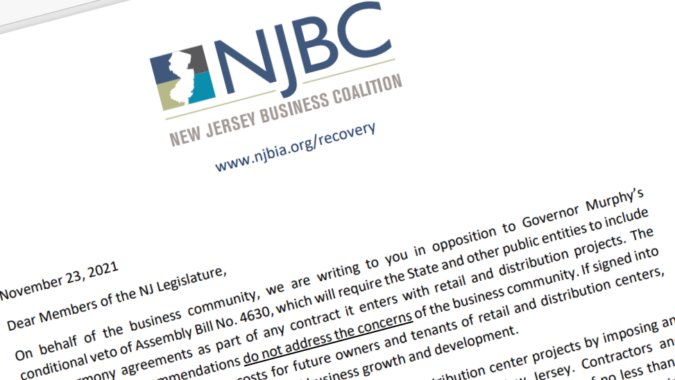The bill that will inflict great pain on small businesses and main street businesses goes to the Legislature on Monday for a concurrence vote – and the New Jersey Business Coalition is urging lawmakers to vote no.
A-4630/S-577 requires New Jersey and other public entities to include labor harmony agreements as part of any pact they enter with retail and distribution center projects.
Gov. Phil Murphy vetoed the bill last month to recommend the minimum employee threshold for retail establishments be increased from 10 employees to 20 employees. But even with that minor change, the legislation would raise costs for owners and tenants and discourage others from pursuing such projects.
As an example of the damage it could do, a salon of 20 employees would be required as part of their lease to have a labor harmony agreement, NJBIA President Michele Siekerka said in a press conference this past week.
“This legislation places an undue burden on future retail and distribution center projects by imposing an additional mandate that will drive up the cost of doing business in New Jersey,” the Coalition wrote in a letter to the Legislature this week. “Contractors and subcontractors will be required to enter into labor harmony agreements for a period of no less than 5 years if they wish to work on qualifying projects.
“While the bill requires contractors to enter into agreements, the actual labor harmony agreements do not apply to the construction stage of the project, but only to the retail and distribution operations of the subsequent occupants of the buildings.”
The Coalition, with more than 80 leading business and nonprofit groups signing on, detailed the following impacts if the bill is enacted:
- Distribution centers that provide hundreds of jobs and opportunities for career advancement for New Jerseyans may choose to build in neighboring states or move their operations when it came time to renegotiate agreements with the state or other public entities in order to maintain lower operating costs.
- Entrepreneurs seeking to open a retail establishment on main street would have to contend with collective bargaining demands if they receive any public financial incentives as they get their business off the ground.
- Redevelopment projects seeking to revitalize abandoned shopping centers or other under-utilized spaces will struggle to attract new tenants willing to contend with yet another costly labor mandate.

